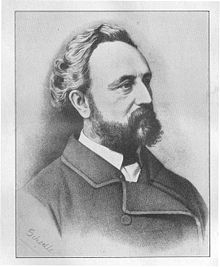Robert Gerwig: Difference between revisions
No edit summary |
wikilink fix |
||
| Line 6: | Line 6: | ||
Gerwig was born on 2 May 1820 in [[Karlsruhe]], in the [[Grand Duchy of Baden]], and attended the Großherzogliches Polytechnikum (now known as [[Karlsruhe Institute of Technology]]) where he studied civil engineering, primarily road construction. |
Gerwig was born on 2 May 1820 in [[Karlsruhe]], in the [[Grand Duchy of Baden]], and attended the Großherzogliches Polytechnikum (now known as [[Karlsruhe Institute of Technology]]) where he studied civil engineering, primarily road construction. |
||
In the 1860s, Gerwigs attention and professional skills turned toward [[rail transport]]. He was one of the principal designers of the [[Black Forest Railway (Baden)|Black Forest Railway]], which avoided steep grades through the use of numerous loops and curved [[tunnel]]s. He applied the principle again for the [[Gotthard Railway]] at the double loop of [[Wassen]]. His last rail project was the [[ |
In the 1860s, Gerwigs attention and professional skills turned toward [[rail transport]]. He was one of the principal designers of the [[Black Forest Railway (Baden)|Black Forest Railway]], which avoided steep grades through the use of numerous loops and curved [[tunnel]]s. He applied the principle again for the [[Gotthard Railway]] at the double loop of [[Wassen]]. His last rail project was the [[Höllentalbahn (Black Forest)|Höllental Railway]], also in Germany's [[Black Forest]] region. |
||
Later in life, Gerwig turned to politics. He was active in the government of [[Baden]]. He also served as the first director (1850-) of the Clockmakers School (''Uhrmacherschule'') in [[Furtwangen]]. In 1852 he began collecting [[clock]]s; his collection formed the basis for 'Study Collection" of the school and eventually became the [[German Clock Museum]] (''Deutsches Uhrenmuseum''). Gerwig died on 6 December 1885. |
Later in life, Gerwig turned to politics. He was active in the government of [[Baden]]. He also served as the first director (1850-) of the Clockmakers School (''Uhrmacherschule'') in [[Furtwangen]]. In 1852 he began collecting [[clock]]s; his collection formed the basis for 'Study Collection" of the school and eventually became the [[German Clock Museum]] (''Deutsches Uhrenmuseum''). Gerwig died on 6 December 1885. |
||
Revision as of 18:34, 10 December 2019

Robert Gerwig (1820–1885) was a German civil engineer.
Gerwig was born on 2 May 1820 in Karlsruhe, in the Grand Duchy of Baden, and attended the Großherzogliches Polytechnikum (now known as Karlsruhe Institute of Technology) where he studied civil engineering, primarily road construction.
In the 1860s, Gerwigs attention and professional skills turned toward rail transport. He was one of the principal designers of the Black Forest Railway, which avoided steep grades through the use of numerous loops and curved tunnels. He applied the principle again for the Gotthard Railway at the double loop of Wassen. His last rail project was the Höllental Railway, also in Germany's Black Forest region.
Later in life, Gerwig turned to politics. He was active in the government of Baden. He also served as the first director (1850-) of the Clockmakers School (Uhrmacherschule) in Furtwangen. In 1852 he began collecting clocks; his collection formed the basis for 'Study Collection" of the school and eventually became the German Clock Museum (Deutsches Uhrenmuseum). Gerwig died on 6 December 1885.
References
External links
- 1820 births
- 1885 deaths
- People from Karlsruhe
- People from the Grand Duchy of Baden
- German Protestants
- National Liberal Party (Germany) politicians
- Members of the Second Chamber of the Diet of the Grand Duchy of Baden
- Members of the 3rd Reichstag of the German Empire
- Members of the 4th Reichstag of the German Empire
- Members of the 5th Reichstag of the German Empire
- German civil engineers
- German railway mechanical engineers
- Europe rail transport stubs
